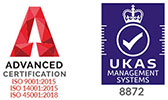There are a few different battery types that are used to power an electric forklift, but two are far more common than their counterparts: sealed lead-acid batteries and absorbed glass mat batteries. Forklift batteries were first invented in 1859 by a Frenchman called Gaston Plante and lead-acid battery technology was the first to be brought in for commercial use.
Since then, lead-acid batteries have been the leading source of stored energy for a number of machines, including the following:
- Forklifts
- Golf carts
- Wheelchairs
- Automobiles
The reason why lead-acid batteries are used for so many different applications is because of their overall reliability and relatively low cost. But there’s still another battery to account for that’s also used to power electric forklifts: absorbed glass mat (AGM) batteries, and we’re on hand to explain the differences between the two.
What are the different types of forklift battery?
Sealed lead-acid forklift batteries
These batteries are relatively maintenance-free and are a popular option to power machines that are for use in controlled working environments, such as warehouses. The acid inside the forklift battery is formed into a gel that’s then sealed inside the cell whilst the cell caps will allow the battery to vent whilst it’s being charged.
In order to elongate the lifespan of your forklift battery, the majority of manufacturers often recommend operating the battery above 40% discharge but below 80% discharge. When left uncharged for a long period of time or when the forklift is on charge for a considerable length of time, it can cause the battery to become damaged.
There are a number of advantages to having a forklift that’s powered using a sealed lead-acid forklift battery, including:
- They’re inexpensive to buy and fit
- Cheap to manufacture
- The technology used is mature, reliable, safe and well-understood
- Durable and dependable
- Capable of high discharge rates
Absorbed glass mat (AGM) batteries
AGM batteries are often used in German automobiles due to their durability and impressive ability to withstand great vibrations and extensive shock. As such, they’ve since been used to power electric forklifts – ideal for those who need material handling equipment for use outdoors or on rough, loose or uneven terrains. Much like with sealed lead-acid batteries, these are maintenance-free and well-sealed, although AGM batteries are twice the cost of the former.
What is the average life expectancy of a conventional forklift battery?
A forklift battery will usually have a work lift of around 1,500 cycles, but if you’ve purchased a used forklift as opposed to a brand new forklift, the battery manufacturer will be able to check how the battery was charged and how it was watered, together with any discharge. This can be done using destructive cell analysis as it’ll show grid corrosion, depletion of active material and positive plate growth.
Keeping records of any maintenance, repairs or replacement of your forklift battery will help you to sell it on in the future, if you decide to, but it’ll also assist in verifying how safe your forklift is to use which gives peace of mind all round.
How to prevent damage to your forklift battery
The ways in which you can avoid causing damage to your forklift battery include:
- Avoid deep-cycling the forklift as it can shorten the lifespan of the battery
- Ensuring water levels are topped up and above the lower discharge limit at all times
- Do not operate the forklift when the battery is running low
- Stick to the weight and height limits that are outlined on the forklift itself so as to avoid overexertion by the battery
Multy Lift are pleased to be able to provide brand new forklifts and used forklifts to customers throughout the East Midlands and beyond. Our high-quality, robust material handling equipment can always be relied on to get the job done. If purchasing a forklift isn’t the best option for you, then renting a forklift would be the most flexible, cost-effective solution. If you’d like more information about how we can meet your budget and requirements, get in touch with a member of our expert team today – we’re always happy to help.







